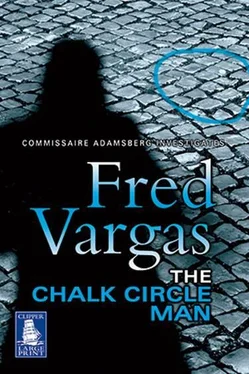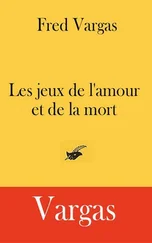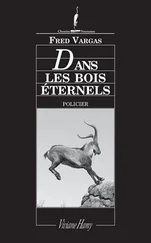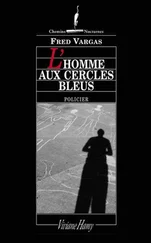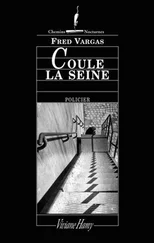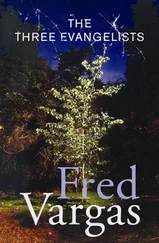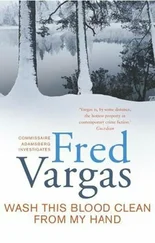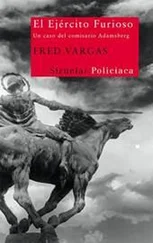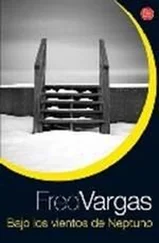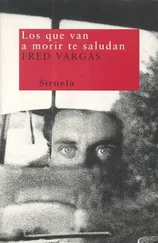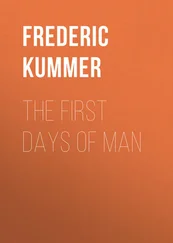‘Yes,’ said Adamsberg. ‘I did put this tie on. It’s a fitting custom, isn’t it?’
And that was all. Except for the hand which he sometimes laid on Danglard’s arm. More than two hours out of Paris, Adamsberg stopped the car on a forest track. Here the summer heat failed to penetrate. Danglard read a notice: Bertranges Forestry Estate , and Adamsberg said, ‘This is it,’ as he put on the handbrake.
He got out of the car, took a deep breath and looked around, with a nod. Spreading a map on the bonnet, he called Castreau, Delille and the six men from the van to come over.
‘We’ll go this way,’ he said, pointing. ‘We take this track, then this one and the next. Then we’ll check all the paths in the southern sector. What we’re going to do is search the zone around this lodge in the forest.’
At the same time, his finger described a circle on the map.
‘Circles, always circles,’ he murmured.
He crumpled the map up clumsily and gave it to Castreau.
‘Get the dogs out,’ he added.
Six Alsatians on leads jumped out of the van, barking furiously. Danglard, who didn’t greatly care for the huge beasts, kept to one side, folding his arms and keeping the folds of his floppy grey jacket pulled tight round him as his only protection.
‘All this palaver to track down old Clémence?’ he said. ‘But how will the dogs manage it, anyway? We don’t even have a scrap of her clothing for them to sniff.’
‘I’ve got what we need,’ said Adamsberg, taking a small packet from the van and putting it down in front of the dogs.
‘Ugh, rotten meat,’ said Delille, wrinkling his nose.
‘Smells of death,’ said Castreau.
‘Yes,’ said Adamsberg.
He jerked his head and they took the first track on the right. The dogs were pulling hard on their leads and barking. One of them had already wolfed down the piece of meat.
‘Dumb creature, that dog,’ said Castreau.
‘I don’t like this at all,’ said Danglard.
‘No, I thought not,’ said Adamsberg.
Walking through a forest with dogs is a noisy process. Branches and twigs cracking, little creatures running from underfoot, startled bird-calls, and the constant sound of feet crunching on leaves and dogs crashing through undergrowth.
Adamsberg was wearing his faithful black trousers. He walked along with his hands partly tucked into his belt, the tie flying back over one shoulder, saying nothing, but attending to the slightest deviation by the dogs. Three-quarters of an hour passed before two of the dogs simultaneously left the path, taking a sharp left turn. There was no track there, just undergrowth. They had to push under branches and round tree trunks, making slow progress, with the dogs pulling at the lead. A branch snapped back painfully into Danglard’s face. The leading dog, Alarm Clock by name but usually known just as ‘Clock’, stopped after they had gone about sixty metres. He turned round in his tracks, barking and raising his head, then whined and lay on the ground, his head held upright, looking pleased with himself. Adamsberg had frozen, his fingers locked on his belt. He looked at the small patch of ground where Clock was lying, a few square metres between the birches and the oaks. He reached out and touched a branch that had been broken several months earlier. Moss had grown on the broken end.
His mouth twisted, as it always did when he felt a powerful emotion. Danglard had noticed that before.
‘Call the others,’ Adamsberg said.
Then he watched, as Declerc brought up the bag of tools and signalled that they could start work. Danglard watched apprehensively as Declerc opened the bag and brought out pickaxes and shovels, which he distributed to the others.
For an hour he had been refusing to think that this was what they were looking for. But now he could no longer escape the evidence. This was what they were looking for.
‘A rendezvous with someone we know,’ Adamsberg had said the day before. The black tie. So the commissaire did not shrink from symbolism, however heavy-handed.
After that, the shovels started to make an infernal noise as metal struck on stone, a sound that Danglard had heard too many times in the past. The pile of earth alongside grew higher. He’d seen that too many times as well. The men were practised at digging. They worked quickly, bending their knees.
Adamsberg, still gazing fixedly at the growing hole, touched Declerc on the arm.
‘Take it slower now. Not too hard. Use the smaller shovels.’
They had to move the dogs away – they were making too much noise.
‘The mutts are getting excited,’ Castreau observed. Adamsberg nodded, continuing to stare into the hole. Declerc was directing operations. He was lifting earth gingerly with a light trowel. Suddenly he sprang back as if he had been attacked. He wiped his nose with his sleeve.
‘Ah, look,’ he said. ‘A hand, I think. I think it’s a hand.’
Danglard made a prodigious effort to detach himself from the tree trunk against which he was leaning, and approached the pit. Yes, it was a hand. A ghastly, terrible hand.
Now one man was uncovering the arm, another the head, and a third shreds of blue fabric. Danglard felt sick. He moved back, reaching behind him with his hand to find the tree trunk, his solid oak tree. He felt its bark and clung to it, as his eyes continued to see the image he had glimpsed of a horrible corpse, with black slimy skin.
I should never have come, he thought, closing his eyes. And he did not even want to know for the moment whose corpse the ghastly thing could be, or why they had come to look for it, or where they were, and why he didn’t understand. All he knew was that the commissaire must be wrong about the rendezvous. That corpse had been there for months. So whoever it was, it couldn’t be Clémence.
The men worked on for another hour, with the stench becoming intolerable. Danglard had not shifted an inch from his comforting oak tree. He kept his gaze fixed upwards. Between the trees you could only see a little bit of sky and this corner of the forest was dark. He heard Adamsberg say gently:
‘That’ll do for now. Let’s have a drink.’
The men threw down the tools and Declerc produced a bottle of cognac from the bag.
‘It’s nothing fancy,’ he explained, ‘but it’ll disinfect us a bit. Just a drop each.’
‘Against the rules, but indispensable,’ said Adamsberg.
The commissaire walked over to Danglard, holding a plastic cup. He didn’t say ‘How are you doing?’ or ‘Feeling better now?’ In fact, he said nothing. He knew it would be all right in half an hour, and Danglard would be able to walk again. Everyone knew about his squeamishness, and no one blamed him for it. They were quite busy enough with their own internal struggles around the foul-smelling pit.
The nine men sat a little way from the excavation, near Danglard who remained standing. The doctor, who had been prowling round the pit, came to join them.
‘So, Dr Death,’ said Castreau, ‘what does all this tell you?’
‘It tells me that it was a woman, elderly, sixty or seventy perhaps. And she was killed by a wound to the throat, getting on for six months ago, I’d say. It’s going to be hard work identifying her, lads.’ (The pathologist often said ‘lads’, as if he were teaching a class.) ‘The clothes look like ordinary mass-produced stuff, they won’t help us. I don’t think we’ve got any personal items in the grave, either. And there’s not much hope the dental records will give us anything. She had perfect teeth, like you and me, no fillings, no dental work at all, as far as I can see. That’s what it tells me, lads. So you’re going to be hard put to it to find out who she is.’
Читать дальше
